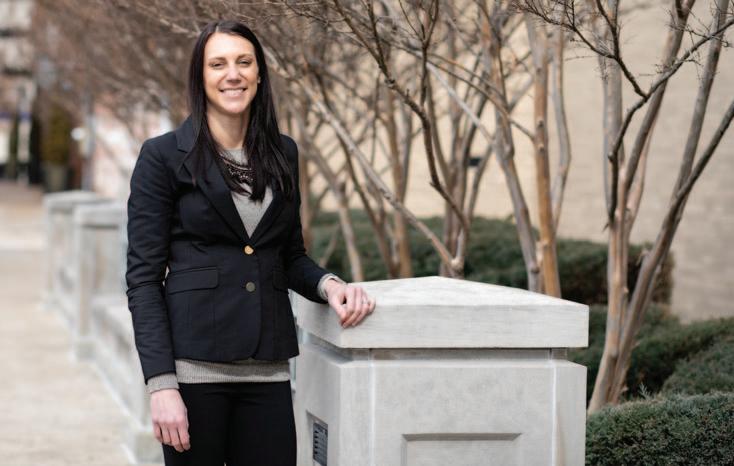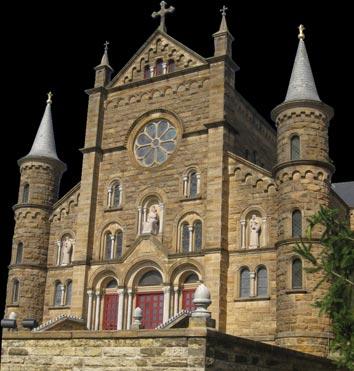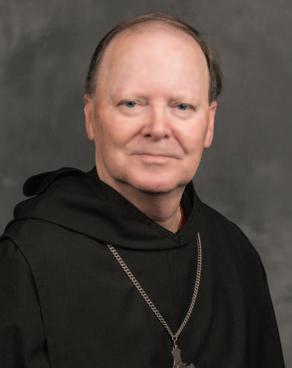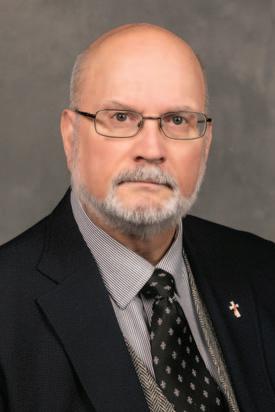

TheGift Planner
Qualified Charitable Distributions:
10 things to consider when making a gift from your IRA

Evansville, IN, native Lacy Bender believes it is important to give back to the community. Her Catholic faith and tight-knit family have taught her that it is better to give than to receive and to always treat others as you want to be treated.
“I personally feel that I am blessed and that gives me the opportunity to donate my time, talents and treasures to those in need,” she says. “Whether that be giving it directly to the hands of a homeless person on the corner or indirectly through a charity that will help
feed the homeless or educate our youth to become the leaders of tomorrow.”
Lacy studied accounting at the University of Evansville and received her MBA from the University of Southern Indiana. She is currently pursuing a master’s degree in taxation from DePaul University.
Her career as a CPA and vice president at Harding Shymanski & Co. in Evansville allows her to help clients meet their charitable giving and financial goals.
“One of our goals as trusted advisors includes understanding our clients’ charitable objectives and finding the most tax-effective way to achieve them,” she says.
“It’s extremely rewarding knowing that I’ve been able to help someone fulfill their charitable goals that aligns with their financial plan.”
One of the strategies she recommends is making Qualified Charitable Distributions (QCD) from an IRA. Taxpayers who are 70 ½ or older can donate up to $100,000 annually from their IRA to one or more qualified public charities. If the taxpayer is married and each spouse has an IRA, each can give up to $100,000.

Lacy Bender


Rt. Rev. Kurt Stasiak, OSB Archabbot of Saint Meinrad
Dear Friends,
In this issue of The Gift Planner, Ms. Lacy Bender talks about some of the important considerations involved in making Qualified Charitable Distributions from your retirement account.
Her insights are very instructive to anyone who is thinking about making this sort of gift, especially in light of many of the recent changes in tax law brought on by the pandemic.
I know many of you have made gifts to Saint Meinrad in this way. I hope you find Ms. Bender’s observations helpful. Some who are receiving this Gift Planner may not have explored this sort of gift. I hope you will find her comments interesting.
As always, I am grateful for your ongoing support of the work of Saint Meinrad. As we continue to navigate this still-difficult time of pandemic, be assured of the prayers of the monastic community for you and your family.
May God continue to bless you abundantly,

Here are 10 things Lacy says to consider when giving through a QCD.
1. The amount a taxpayer donates through a QCD is excluded from his/her gross income, but the taxpayer cannot claim a charitable contribution deduction. In return, the taxpayer could be eligible for additional deductions and credits that are based on adjusted gross income. In addition to reducing federal and state taxes, a QCD could lower Medicare premiums because the taxable income is now lower.
2. A QCD might not always be as beneficial as donating stock to a charity. It depends on the circumstances. Donating stock that has appreciated in value allows the donor to receive a charitable contribution deduction as well as avoid paying capital gains tax on that investment.
“Donating stock to a specific charity is a very powerful tool to get a nice tax savings,” says Lacy. “You have to outweigh what’s going to give you the most benefit, the QCD or to donate stock.”
3. A Qualified Charitable Distribution can be all or part of the annual required minimum distribution (RMD) from an IRA account. Previously, when individuals
turned 70 ½, they had to start taking RMDs. The SECURE Act of 2019 now allows taxpayers who turn 70 on July 1, 2019, or later to delay their first RMD to April 1 of the year they turn 72. Roth IRAs do not require withdrawals until after the owner’s death.
“Qualified Charitable Distributions are a great way to reduce the tax impact of an RMD because they reduce an individual’s RMD for the year and reduce the IRA balance, which lowers future RMDs,” explains Lacy.
4. The CARES Act provided a one-year suspension of RMDs for 2020. In addition, the SECURE Act allows individuals over age 70 ½ to make contributions to their IRA. However, the SECURE and CARES Acts added a provision that prevents people from reusing their tax-deductible IRA contributions as a QCD.
5. The QCD must go to a 501(c)(3) public charity. The IRS website has a list of these charities. Taxpayers can also call the charity directly or check its website to find out if it is a qualified public charity. Donor-advised funds, supporting organizations and private foundations do not qualify for QCDs.
6.QCDs must be made with taxable IRA funds. They cannot be made from an employer-sponsored retirement plan, including SIMPLE IRAs and simplified employee pensions (SEP), unless the accounts are inactive and no longer receiving contributions. QCDs can be made from a Roth IRA, but they must be from the taxable portion.
7. The QCD must go directly from the taxpayer’s IRA to the charity.
8. The taxpayer cannot receive anything from the charity in return for the QCD.

9. Whenever taxpayers take a distribution from their IRA, they receive a 1099-R form. That document will not show that the taxpayer made a QCD. Individuals who make a QCD should let their tax preparers know.
10.A taxpayer should not use a QCD to make contributions that result in state tax credits. This could jeopardize the tax status of the IRA.
Lacy encourages individuals to discuss their charitable giving objectives with their financial planners and CPAs so they can help develop the best strategy to accomplish those goals. ◆
“A Qualified Charitable Distribution (or rollover) from your IRA is a great way to make a gift to Saint Meinrad. Not only does it reduce
the
taxable amount of
your Required Minimum Distribution from your IRA, it also is deducted from the top line of your income. This can reduce your taxes significantly, depending on your personal circumstances. As always, consult your tax advisor for details on your individual situation.”
Michael Shumway Director of Planned Giving and Foundation Relations


Neither the author, the publisher, nor this organization is engaged in rendering legal or tax advisory service. For advice or assistance in specific cases, the services of an attorney or other professional advisor should be obtained. The purpose of this publication is to provide accurate and authoritative information of a general character only. Watch for tax revisions. State laws govern wills, trusts and charitable gifts made in a contractual agreement. Advice from legal counsel should be sought when considering these types of gifts. © Saint Meinrad Archabbey, 2021.



